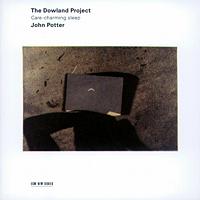
Coming clean
John Potter's
'Care-charming sleep'
finds REX HARLEY
unimpressed
ECM 476 052-2
|

|
This is the second album from The Dowland Project. The first, unsurprisingly, concentrated on the eponymous composer; this one offers interpretations of, broadly speaking, his contemporaries, both in England and Italy. The musicians are drawn from different musical backgrounds: classical, early music, jazz. Bass player, Barry Guy, is also a respected composer in his own right. Nothing particularly new here: it was the ECM label which gave us the collaboration between the Hilliard Ensemble, of which John Potter is a member, and saxophonist Jan Garbarek. Musical purists will steer clear of such adventures. The rest of us will probably pose the simple question: 'Does it work for me?'
Well, before we go any further, I should come clean. For me, it doesn't. In fact, the more I listen to the music on offer, and read the accompanying notes in the very beautiful little book, the more irritated I become. There are pleasures to be found on this disc, but they are isolated events which are outweighed by the lugubrious feel of the programme as a whole.
The culprit is, I'm afraid, only too obvious: vocalist John Potter, who also organised the whole affair and wrote the booklet notes. His instrumental accompanists and, in the best moments, soloists, cannot be faulted. Maya Homberger's phrasing on the Baroque violin is peerless, her tone warm and expressive. The best four minutes on the disc come in her duet with Stephen Stubbs -- (baroque guitar) -- in Cipriano da Rore's Ancor che col partire [listen -- track 2, 0:00-1:15]. Also most effective is John Surman's soprano saxophone, sounding quite at ease with material written long before the instrument's invention [listen -- track 11, 0:00-1:00]. At times it has almost the feel of a cornetto. Interestingly, Tim Garland, in an interview preceding the first performance of his Coltrane Variations recently, commented on the way this versatile instrument acts as a kind of sonic bridge between the classical and jazz traditions. Surman's playing here only serves to emphasise that opinion.
But the bulk of this CD involves the vocal pieces. As a soloist John Potter is a tenor of limited means. His voice is not unpleasant, but lacks variety or genuine ease of expression. To compensate, there is a histrionic edge to his delivery, and at worst things sound decidedly precious. Emotion is grafted onto the songs rather than emerging inherently from the music, and this reaches rock bottom in the travesty of Monteverdi's Lamento del Ninfa, called here Refrain 4 -- Amor dov'è la fe'. Some very silly sleeve notes on gender issues, which add up to precisely nothing, merely compound the crime.
In case it may be felt that I'm exaggerating here, I refer interested parties to the recording which shows how it should be done: Nikolaus Harnoncourt's 1984 performance, still available on Teldec 4509-92181-2, with soloist Ann Murray, accompanied by the vocal trio of Philip Langridge, Kurt Equiluz and Rudolf Hartmann. The nymph's lament itself is framed by these three male voices, and the opening passages contain some of the most remarkable sliding dissonances in the composer's oeuvre. It is out of this strange, halting, even jarring music that the simple descending figure of the lament emerges. Not on this ECM recording. What we are left with is John Potter's trans-sexual nymph sounding less sad than bored, and Monteverdi's music reduced to unforgivable blandness. The economy of the original score is self-indulgently stretched too. Even with the top-and-tailing the piece comes out over two minutes longer than Ann Murray's version [listen: track 13, 2:05-3:34].
So. I'm not impressed. There will be some who are, no doubt; who will perhaps see this venture as an opening of musical doors, where I regard it as the waste of several good musicians and the self-promotion of a lesser. And if sleep is the end product for listeners I, for one, will be not a whit surprised.
|

